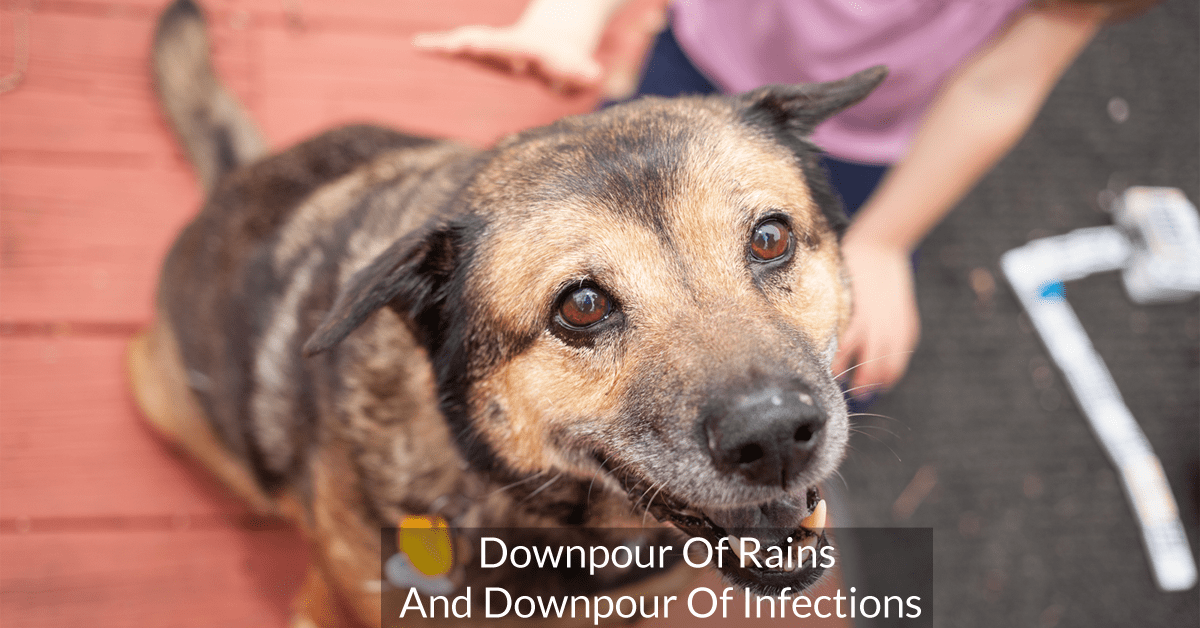Tip top rain drops, a warm cup of tea and some snacks, this reminds us of the oh-so- lovely monsoon season and the bliss it brings. A new atmosphere, a new ray of rainbow, joy and fun paper boats. But did you know, along with happiness and peace this season comes forward with some challenges which are rather easy to prevent and tougher to face. If you have ever wondered what are the various challenges that this season brings? How to protect your pets from the dangers and how to ensure your pets are well shielded from all the odds, you have come to the right place. Yes, in today’s blog let us uncover some of the infections and diseases our pets might attract this monsoon season and how to shield them against the same.
1. THE TANTRUM OF TICKS
WHAT ARE TICKS?
Ticks are small bugs and are ecto-parasitic in nature which harm a wide range of animals. Ticks are quite dangerous and tend to attach on the body of the host and suck blood. They derive nutrition from the hosts’ blood.
WHAT HARM DOES THEY CAUSE?
- Ticks are known to carry infectious agents like protozoa Babesia which causes the deadly disease ‘Tick Fever’.
- Ticks also carry other infectious agents such as Ehrlichia canis which again contributes to the tick fever bandwagon
- They also tend to cause diseases such as hepatozoonosis and anaplasmosis.
WATCH OUT FOR THESE SIGNS:
- Fever [Temperature exceeding 103 F to 104.5 F]
- Lethargy and anorexia [inappetence, dullness and low on energy]
- Vomiting/ diarrhoea
- Change in behaviour [depression, isolating oneself]
ENSURE PROTECTION BY:
You can always adopt healthy practices by ensuring 360 degree protection. Here are some tips you can follow.
- Use of anti-tick and flea shampoos
- Use of anti-tick and flea sprays
- Use of medicated anti-tick collars
- Use of spot-ons which generally protects your pets for a span of 30 days approximately.
- Use of drugs which are suggested by your vet [such as fluralaner,etc] these drugs generally offer protection against ticks-fleas for a span of 3-6 months.
- Adopting the habit of cleaning your dogs’ paws after walks.
- Brushing coat of your dog every day or every alternative days
Fun Fact: brushing your pets’ coat will not only help you keep an eye on ticks-fleas but will also make your furry friend happy! Well, it is a great option to increase Pet Parent- Pet Bond.
2. THE FRUSTRATING FLEAS
WHAT ARE FLEAS?
Fleas are small flat bodied- flightless insects that are also grouped under the family of ectoparasites. They are very similar to ticks as they too survive by consuming blood from their hosts. Unlike ticks, fleas do not attach themselves on the skin, rather they suck blood and keep on moving or running on the fur- skin.
WHAT HARM DOES THEY CAUSE?
- Itching and dermal issues
- They tend to cause FAD [flea allergic dermatitis]
- They can also transmit tapeworm infection to your pet dog.
WATCH OUT FOR SIGNS:
- Intense itching and scratching
- Redness on skin
- Restlessness due to constant bites of fleas
- Red papules on skin
- Rough hair coat
ENSURE PROTECTION BY:
The same protocol can be followed as anti-tick prevention mentioned previously.
- By use of spot-ons
- By use of medicated shampoos [anti tick and flea]
- By adopting good grooming practices [brushing their coat often]
- Not allowing your pets roam in dirty bushes
3. WORM INFECTION
WHAT ARE WORMS?
There are various kinds of worms, but today let us focus particularly on tapeworms. Tapeworm or worm load can happen via unclean surroundings. Accidental ingestion of fleas can end up causing tapeworm infection. You may observe your pet is losing weight despite a big healthy diet. You may observe cucumber seed-like structure in your dogs’ feces (which is actually the proglottid of tapeworm) You may observe your dog is scooting, has rough hair.
ENSURE PROTECTION BY:
- Following routine deworming protocol
- Make sure your pet has been routinely checked by a Vet for worm load- any other associated condition.
- Use anti-flea medications/spot ons/shampoos and sprays
4. GASTROINTESTINAL DISEASES
With the monsoon comes the storm of gastrointestinal infections. It is pretty common in humans as well to have tummy upset, diarrhoea and vomiting when we eat food from street vendors during monsoon season. However, for our dogs, it is not street food but it definitely is street garbage.
WHAT CAN GO WRONG?
- Bacterial infections or viral infections of the gastrointestinal tract can be potentially life threatening.
- However these infections can be mild too. [Totally depends upon the type of pathogen and immunity of your pet]
- Your pet may become emaciated due to poor nutrition and infection load
- Your pet may attract another set of secondary infections [due to compromised immunity]
- Dehydration is common outcome due to excessive vomiting
WHAT DO YOU OBSERVE:
- Your dog is vomiting (please make sure you know what are the contents of vomitus, how frequently they are vomiting and the colour of the vomitus- as this may help in establishing a good diagnosis)
- Diarrhoea, most common outcome
- Anorexia, as they refuse eating food or water
- Weight loss and listlessness
- Behavioural changes
- They may exhibit signs of pain in the abdominal areas
ENSURE PROTECTION BY:
- Walking your dog on leash as this provides you the power of control over them and they will walk wherever you allow them to.
- Behavioural training. It is a myth that only puppies can be trained. Even adult dogs can and will listen to you if you are firm and bold with your instructions. Yes, dogs do understand what you speak, so next time when they are trying to go near garbage- say NO loud and clear and pull them back, so they will understand that this is something which is not to be done.
- In case your dog ends up getting gastrointestinal upset, please make sure you do not delay this further and take your pet to the nearest vet as soon as possible.
- Gastro cases can quickly deteriorate as immunity of the body goes down and hence, secondary infections can quickly set in.
Monsoon is a fun season, full of happiness and joy. It is important to keep these few bits of information in your mind as we prepare to embrace the rainy season.
Here’s to good immunity, adequate protection and lots of cuddles with our furry paws for the season!



